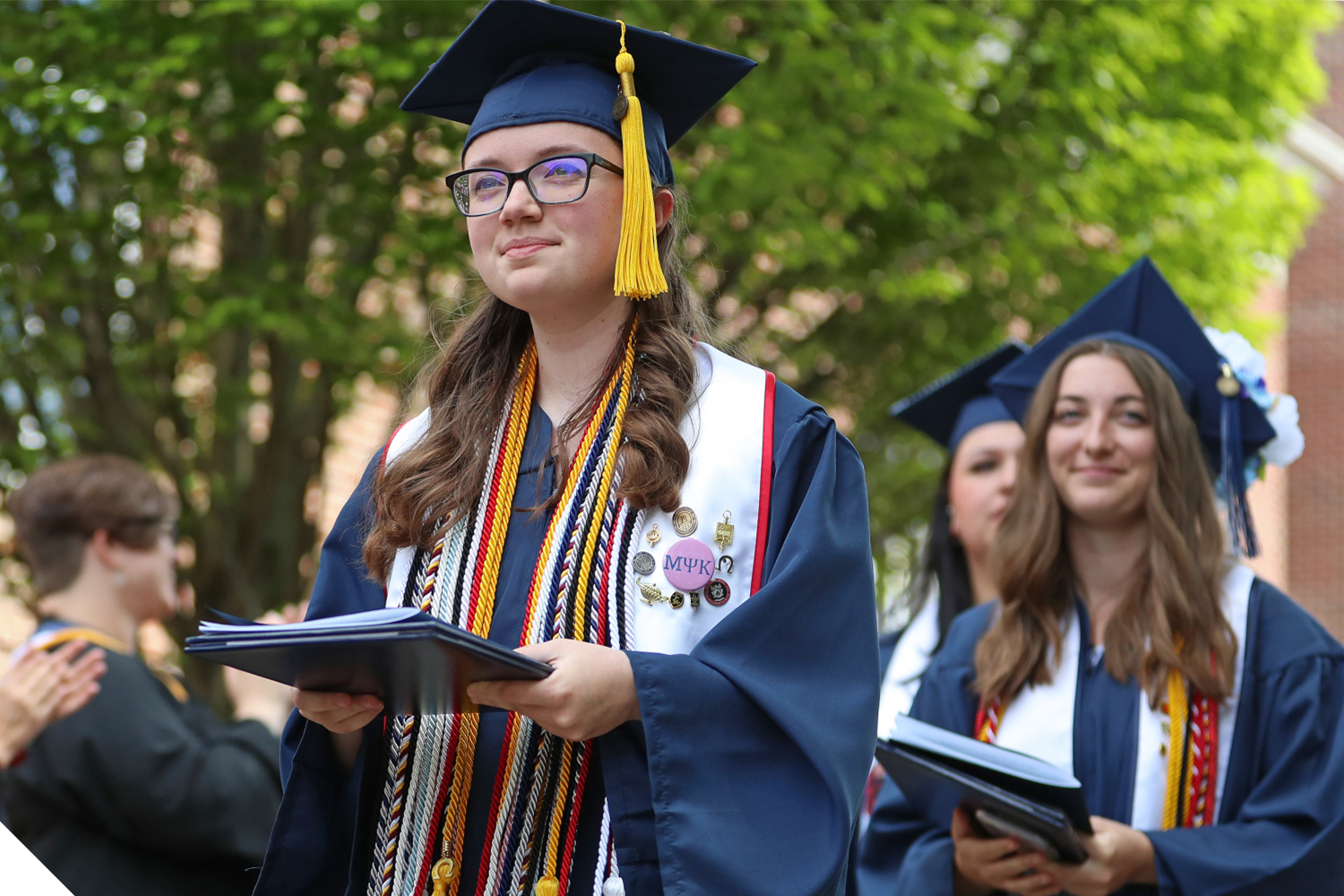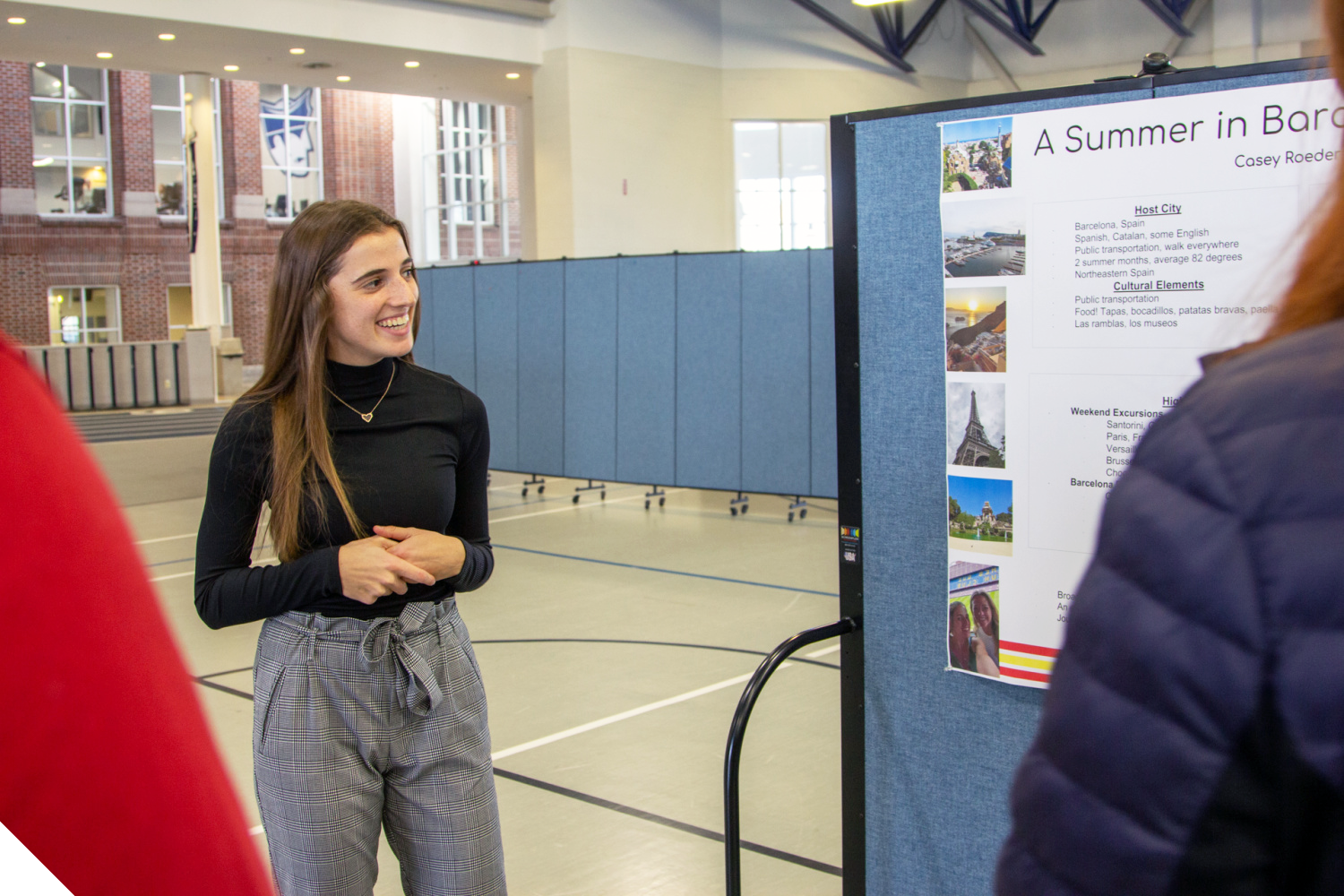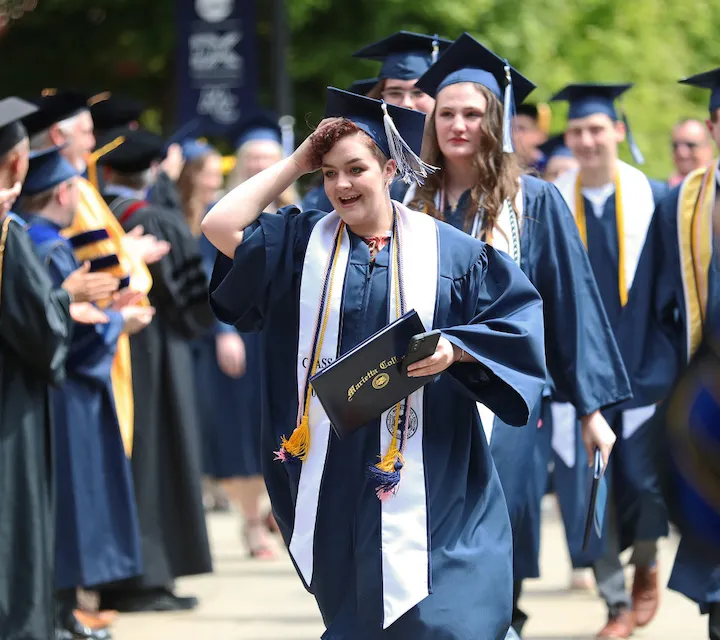Prepare for Anything. Achieve Your Full Potential.
The Marietta College Honors Program offers students with high scholastic ability and keen intellectual curiosity a stimulating and challenging academic environment in which to pursue their education. The Program has two types:
The Curriculum Honors Program for incoming and second-year students
The Research Honors Program by which students earn Honors in a Discipline
Students may earn official recognition by completing either Curriculum Honors or Research Honors.
In addition to specialized coursework, students in the Honors Program have the opportunity to go on trips and excursions sponsored by the program, exclusive on-campus events, access to some of the best housing on campus (including for first-year students), early course registration, access to the Honors Lounge, and more!
Graduation with College Honors
Students who complete both the Curriculum Honors and Research Honors Programs with a final overall GPA of 3.30 or greater will graduate with College Honors.
For more information, contact the Honors Program Director:
The Curriculum Honors Program
Curriculum Honors is designed for students seeking an intellectual challenge and desire the benefits of a cohort of dedicated fellow scholars and enhanced cultural experiences during their college career.
The Honors Program has three main missions. The first is to allow students to get additional exposure to specialized research. Students in honors enhanced classes work more closely with faculty to engage in a dedicated project. This is a great way to directly bridge the knowledge you gain in the classroom with what you will end up doing in your career or prepare you more extensively for a graduate program.
The second goal of the Honors Program is to develop a learning community among the students in the program. Honors students not only take similar challenging courses together but also live on a designated floor reserved only for honors students in some of the best housing on campus. Many in this community make life-long friends.
The third mission is to sponsor exclusive cultural and social experiences. About once a month during the academic year, an event is organized for students in the program. Some of these events are on-campus or involve going to plays, musical performances, movies, and historical sites in the local area. Others involve travel to further cities and locations. These events are offered at little to no cost to the student.
If you are interested in becoming a part of the Curriculum Honors community at Marietta College, fill out the application here.
- Eligibility
Incoming first-year students, by application: Incoming first-year students with at least a 3.50 high school GPA and 1280 SAT or 27 ACT are invited to apply on a competitive basis for admission to the Curriculum Honors Program.
Incoming transfer students, by application: Transfer students entering Marietta College with fewer than 37 credit hours are eligible using the same criteria as above.
Existing students, by invitation: Students already enrolled at Marietta College with a Marietta College GPA of 3.50 and above after completing at least 24 credit hours of coursework may request an application from the Honors Director (honors@marietta.edu).
- Program Requirements
The coursework of the Curriculum Honors Program consists of the following 9-12 hours. It is recommended that students complete the honors curriculum program prior to the start of their senior year.
There are two requirements:
Completion of two Honors Seminars (HONR 101, HONR 201, HONR 202)
Completion of Honors Enhanced Experience (either two Honors Enhanced classes OR HONR 202; these cannot overlap with the two seminars requirement)
For incoming students (the classic track):First semester: Honors Seminar I (HONR 101) serves as the PIO 101 requirement for students admitted into the Curriculum Honors Program. (3 credits)
Second semester: Honors Seminar II (HONR 201) (3 credits)
After completion of the first year: Two honors-designated electives (honors sections of select courses enhanced to provide students with additional experience in research, art, or other discipline specific skills). (6 credits)
For students accepted after their first year at Marietta:The year accepted: Honors Seminar I (HONR 201) (3 credits)
The same year or the following year: Honors Seminar II (HONR 202) (3 credits)
After completion of the first honors seminar: Two honors-designated electives (honors sections of select courses enhanced to provide students with additional experience in research, art, or other discipline specific skills). (6 credits)
For both types of students, the honors-designated electives can be substituted by taking HONR 202 (this class can be taken twice if needed).
To complete the Curriculum Honors Program, students must maintain an overall GPA of 3.30 (3.00 for first-year students only). A students whose GPA falls below these levels may request readmission to the Curriculum Honors Program when their GPA returns above 3.30.


The Research Honors Program (Undergraduate Thesis)
The Research Honors Program allows any junior or senior with a GPA of 3.300 in the discipline and a 3.300 overall to do advanced work under the close guidance of a member of the faculty, typically in the student’s major or minor. Such students present a senior thesis to a thesis committee that includes the thesis director, a member of the Honors and Investigative Studies Committee, and a third (optional) faculty member of the student’s choosing. With this committee’s final approval of the thesis, the student is awarded Honors in a Discipline.
- Eligibility
- An overall cumulative GPA of 3.30 and a cumulative GPA in the discipline of 3.30 is required at the time of the proposal to the thesis committee.
- The student must have a thesis director in the field of study in which the thesis work is to be done. The thesis director must, of course, be willing to support the student’s proposal.
- Program Requirements
- The senior thesis proposal is typically submitted by the student during the second semester of the junior year (or 2-3 semesters prior to the semester in which they will graduate). The proposal must be approved by the student’s thesis committee.
- During their final semester, students must register for 1 to 3 credit hours of honors coursework in the department in which they are pursuing their thesis work (“DEPT” 493). Upon completion of the senior thesis, it must be approved by the student’s thesis committee.
- An overall cumulative GPA of 3.30 and a cumulative GPA in the discipline of 3.30 is required at graduation.
- Approved theses are archived and made available on-line through OhioLink.
